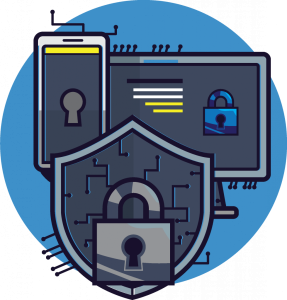Laws and regulations governing cybersecurity
7. Privacy and security in ICT, data protection in cyberspace
Living in the digital age with the idea or feeling that my actions are anonymous or hidden from the eyes of other users[1] is, in my opinion, naive. With the advent of the digital age, not only its positive but also its negative aspects appear.[2] One such negative aspect is the fact that we are less and less interested in the essence of the functioning of services provided in cyberspace.
Our world, which we increasingly understand as the “world of information” or “world of the Internet”, is firmly connected with information and communication technologies that interfere in an individual’s life in a very significant way. These technologies facilitate access to information and simplify or speed up mutual communication between individual users, etc. On the other hand, it is important to realise that any publication of information from our private life on the Internet poses the risk of exploitation by anyone in cyberspace.
All applications, whether used in any computer system, web services[3] and especially social media,[4] collect a considerable amount of information about their users. They do not need this information for their operation, but it allows both the ISP in question to provide a service “for free” and to “target” or modify the services it offers. Information that is not necessary by default for the direct functionality of individual services includes, for example, information of a personal nature (name, surname, email address, telephone number, address, etc.), sensitive nature (e.g. information about the computer operating system used, versions individual applications, cookies, etc.), location data (GPS coordinates, information about Wi-Fi, GPRS, etc.), operational data, etc.[5]
The information can be used in a wide variety of ways. According to the information, a service provider may offer, for example, additional services or advertising based on the requirements, interests or hobbies of users. Thanks to them, the police are able to create a framework for the daily activities of a person who, for example, is lost or abducted and thus expedite their own activities in the search for this person. At the same time, however, the information can very easily be misused by criminals, either to establish contact with a victim or to plan a crime.
By providing (even if involuntarily or unwittingly) the data, the user of the service allows other people to obtain important information about their lives (e.g. information about their behaviour during the day, places visited, activities and people with whom he/she is in contact).[6] At this point, we ourselves become information or a commodity that someone else can trade with.
Various available statistics[7] indicate that the total population is currently approximately 7,359,244,000 people. Of this number, about 3.6 billion people are active Internet users, and more than 2.1 billion people are active users of social media. Mobile devices are owned by more than 3.6 billion users, and more than 1.7 billion users connect to social media through these devices. Social media is dominated by Facebook with more than 1.59 billion users:[8]
In this section, I will try to draw attention to possible security threats that we are used to accepting or not perceiving in effect and in which most individuals or organisations are not even aware of the possible danger.
[1] The term user includes all entities that influence events in cyberspace. It is primarily necessary to include ISPs in this group. However, not all ISPs fall under the jurisdiction of Czech law (either for geolocation reasons or rather because their activities are not regulated by the law). Other “users” will undoubtedly be LEAs (Law Enforcement Agencies – which are allowed by the norms of individual countries to be one of the most intensive interventions in fundamental human rights and freedoms), CERT/CSIRT teams, IT administrators, end users, etc.
[2] E.g. cybercrime, addictions and, among other things, so-called digital dementia. For more details see: SPITZER, Manfred. Digitátlní demence. Brno: Host, 2014. ISBN 978-80-7294-872-7
[3] See e.g. Zlepšování zabezpečení, ochrana soukromí a vytváření jednoduchých nástrojů, které vám dávají možnost kontroly a výběru, je pro nás velmi důležité. [online]. [cit.04/04/2014]. Available from: https://www.google.cz/intl/cs/policies/?fg=1
[4] See Prohlášení o právech a povinnostech. [online]. [cit.04/04/2014]. Available from: https://www.facebook.com/legal/terms
[5] However, some authentication systems also need this additional information to function.
[6] KOLOUCH, Jan, Michal DVOŘÁK, Tomáš NAJMAN and Terezie JANÍKOVÁ. neBezpečné chování na Facebooku. In: Sborník příspěvků ke konferenci: Sociální sítě. Mobilní aplikace. Plzeň: Západočeská univerzita v Plzni, 2014, pp. 39–47. ISBN 978-80-261-0362-2 p. 40
[7] For more details, see e.g.:
World Internet Users and 2015 Population Stats. [online]. [cit.09/08/2015]. Available from: http://www.internetworldstats.com/stats.htm
Digital, Social & Mobile Worldwide in 2015. [online]. [cit.09/08/2015]. Available from: http://www.slideshare.net/wearesocialsg/digital-social-mobile-in-2015?ref=http://wearesocial.net/blog/2015/01/digital-social-mobile-worldwide-2015/
Největší sociální sítě na světě? Facebook je sice jednička, ale… [online]. [cit.10/08/2015]. Available from: http://www.lupa.cz/clanky/nejvetsi-socialni-site-na-svete-facebook-je-sice-jednicka-ale/
Current World Population. [online]. [cit.10/08/2015]. Available from: http://www.worldometers.info/world-population/
[8] Leading social networks worldwide as of April 2016, ranked by number of active users (in millions) [online]. [cit.10/08/2015]. Available from: http://www.statista.com/statistics/272014/global-social-networks-ranked-by-number-of-users/
